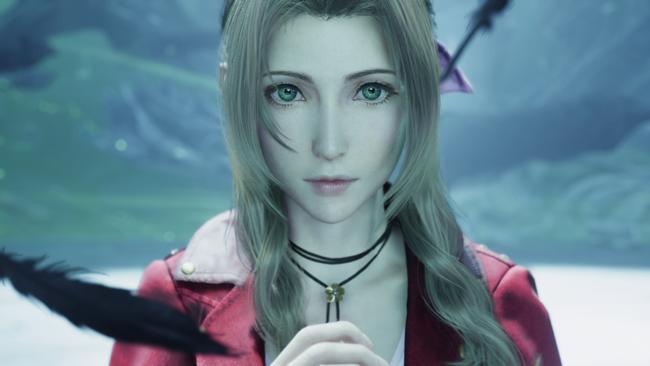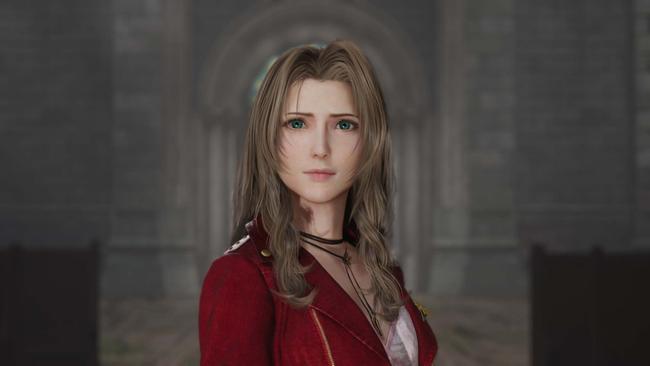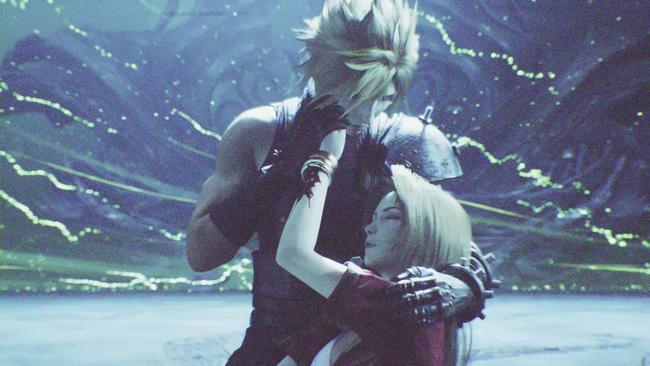Final Fantasy VII Rebirth's ending is perfect because it isn't quite perfect
Aerith Gainsborough dies in the Forgotten Capital. It’s one of those moments that everyone who’s ever played a video game knows about. It’s this medium’s “Rosebud was the sled,” “Soylent Green is people,” “the planet of the apes was the planet of the humans.”
It’s the type of plot twist that’s become so ubiquitous in the broader culture that it completely overshadows similarly momentous beats in the same story. It’s a twist that made itself known so completely over the last 27 years that the developers of Final Fantasy VII Rebirth felt comfortable building a full marketing campaign around the widespread intrigue at how they would adapt the moment.

Way back in 2020, Final Fantasy VII Remake left the door wide open for dramatic narrative swings. Cloud and company caught visions of their own futures, killed the literal manifestations of fate, and set off on what the game described as “the Unknown Journey.”
The question of Aerith’s fate hung over Rebirth before we knew anything about the rest of the game. After all, her death was a moment so heartbreaking in the original that it spawned decades of rumors, hacks, and mods with the express purpose of bringing her back. The question of what would happen to the flower girl only became more urgent as Rebirth’s creative team hinted at yet more major changes in interviews leading up to the game’s release.
Everything in Final Fantasy VII Rebirth plays out more or less the way you’d expect it to. There are a handful of significant diversions, but not enough to knock the fundamentals of the story off-course. Much like Remake it is, by and large, a bigger version of Final Fantasy VII with more polygons and a fancy new combat system - right up until the ending. This is where Remake took its biggest swings and it’s where Rebirth appears ready to diverge as well.
Aerith dies again. It’s a much more dramatic, much less coherent telling of events that involves the dreaded multiverse, cheer-moment cameos from fan-favorite characters, and a very Kingdom Hearts 2-coded final boss fight, but when all is said and done she certainly seems dead. Well, okay, there’s some kind of Force ghost Aerith wandering around who’s maybe a projection of the Lifestream or maybe a flicker from an alternate universe or maybe some other heady science-fantasy concept we don’t know about yet, but at least one Aerith is dead, definitively.

How frustrating is that? After all of that commotion, nothing really changed. The facts of the event are seemingly exactly the same as they were before. Even worse, the literal events are the same but the emotional impact is severely dulled.
Creative director Tetsuya Nomura, in discussing what made the original scene work so well with Game Informer, said “I believe that loss is something that happens unexpectedly, and it's not something so dramatic or drawn out.” Rebirth’s take on the scene is extremely dramatic and drawn out, a death in countless parts punctuated by thrilling boss fights and convoluted timeline-hopping and MCU-esque cameos from Final Fantasy VII expanded universe characters. It’s so dramatic and drawn out that it’s not even fully clear what happened.
Here’s the thing, though: I like this ending. I like it because it complicates a concise emotional experience. It’s easy to be frustrated or alienated by this moment, to assume that Rebirth’s creative team is simply throwing emotional beats at the wall and seeing what sticks before they commit to something, perverting a great story via indecision. But there’s something more complicated going on here.
One of my favorite fully original moments in Rebirth’s story happens right before the fated meeting with Sephiroth. It’s hard to talk about this moment for the same reason most of the ending of Rebirth is hard to talk about - it’s not 100% clear what’s actually happening. Here’s my read, though: Aerith, aware of what’s coming for her and seemingly gifted with the ability to shift into other timelines, takes Cloud on a detour to another world, one on the edge of its own apocalypse. In the quiet before two different multiversal storms, she takes Cloud on a date. Depending on how the player has handled Rebirth’s relationship meters so far, this could be their third date with Aerith, but something about it feels different. It’s one inch off from “real.”
Aerith is putting on a show. She’s presenting herself as playful and carefree, but it’s artificial, a performance as much for her as it is for anyone else. The date goes nominally well - it’s about as charming and romantic as a clearly brain-addled Cloud can muster - but it feels decidedly uneasy. It makes the buildup to her death all the more heartbreaking and stressful.
We’ve just watched her live out her last-day-on-earth fantasy and she just wanted to hang out with the guy she likes. It’s a reminder of her humanity, her youth, the frivolity and melancholy that have surrounded her in equal measure across Remake and Rebirth. I’m still not sure if this Aerith is the one Cloud has been journeying with all this time or a different Aerith from another world attempting to leave behind a memory, but either way it strikes me as almost unbearably sad.

With all this in mind, the image of a praying Aerith, an image that’s burrowed its way into my brain as a visual shorthand for loss, was imbued with so much power. It’s at this point in the game that the - for lack of a better term - “Kingdom Hearts nonsense” starts. Cloud parries Sephiroth’s sword at the last second and Aerith is saved. Reader, I let out a genuine sigh of relief. Then the universe flickers and she’s dead again. She is alive and she is dead, back and forth, over and over. Sephiroth confesses to his true plan: in the original timeline, Cloud was able to process his grief and come to terms with his loss. This time, Sephiroth robs him of that closure by pulling together multiple worlds - some where she lives, some where she dies. It’s an effort to overload his emotional state so completely that he cannot function.
Next up is a big, bombastic boss fight where Aerith and her old flame Zack Fair, both in various states of extradimensional mortality, pop up to give Cloud a hand in holding Sephiroth at bay. The tone of this fight is really, truly weird. It flows like a superhero movie finale, mostly triumphantly ignoring the puzzling tragedy happening around its edges.
When the dust settles, it sure seems like Aerith is dead. It’s too late for this to land as a gut punch like it did in 1997, but it settles in a different way. It’s not sudden per se but it is somehow unexpected. So much happened in between her already confusing “death” and this moment that it’s almost disarming. It reminds me a little bit of the days after loss. It’s the moment where you know someone is gone but for some reason you’re shocked to remember what that absence means.
I’ve been blessed by very little loss in my life, but one universal truth I’ve discovered is that “goodbye” always comes a little too soon. It arrives just before you fully understand what needs resolving and what you wish you could still say. When Aerith returns at the very end of Rebirth, visible only to Cloud, there could be some unease. We are, after all, aware that Cloud is slowly losing his grasp of reality (the moment arrives right after he does some kind of sinister move with the ever threatening Black Materia, a reminder that he’s not out of the woods just yet).

Maybe I was being optimistic when this moment arrived and I felt overwhelmed by peace. It’s such a cathartic concept, to be able to say goodbye one more time, to take a second crack at accepting loss, this time on your terms - a few hours later for Cloud and Aerith, a few years later for some of us, and an eternity for anyone who’s ever lost someone they love.
Factually, all of this could be unwritten in a couple of years when the conclusion to this trilogy finally arrives. Maybe I’m way off-base with my interpretation. Aerith might not even be dead. According to some of the more out-there fan theories, she might be Jenova. Who knows! The game doesn’t exactly leave us with an abundance of exact information.
I know how I felt watching it all play out, though. I went in more than a little cynical - after all, I must reiterate, everyone knows that Aerith dies in the Forgotten Capital, and as good as the Remake games are, they have a penchant for complicating the straightforwardly meaningful. For me, though, the added wrinkles here did what these games do at their best: they created a new and powerful emotional experience out of plot beats I already understood and feelings I’ve already processed.
It’s fitting that a moment of pure, uncomplicated loss would be such a perfect representation of what the Remake project is good at. These are games that so often refuse to reinterpret the literal events of the original but constantly reinterpret our relationship to those events. Loss is not a thing that leaves us, but it is a thing that mutates constantly inside of us. Our relationship to the people we’ve lost becomes more complicated. Sadness is not always the overriding emotion. Sometimes it’s frustration. Sometimes it’s triumph. Often it’s confusion. What’s more Final Fantasy VII Rebirth than that?